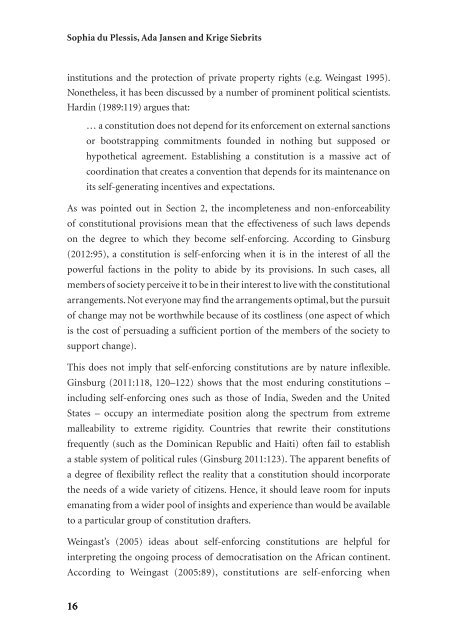ACCORD-ajcr-2015-1
ACCORD-ajcr-2015-1
ACCORD-ajcr-2015-1
- No tags were found...
You also want an ePaper? Increase the reach of your titles
YUMPU automatically turns print PDFs into web optimized ePapers that Google loves.
Sophia du Plessis, Ada Jansen and Krige Siebrits<br />
institutions and the protection of private property rights (e.g. Weingast 1995).<br />
Nonetheless, it has been discussed by a number of prominent political scientists.<br />
Hardin (1989:119) argues that:<br />
… a constitution does not depend for its enforcement on external sanctions<br />
or bootstrapping commitments founded in nothing but supposed or<br />
hypothetical agreement. Establishing a constitution is a massive act of<br />
coordination that creates a convention that depends for its maintenance on<br />
its self-generating incentives and expectations.<br />
As was pointed out in Section 2, the incompleteness and non-enforceability<br />
of constitutional provisions mean that the effectiveness of such laws depends<br />
on the degree to which they become self-enforcing. According to Ginsburg<br />
(2012:95), a constitution is self-enforcing when it is in the interest of all the<br />
powerful factions in the polity to abide by its provisions. In such cases, all<br />
members of society perceive it to be in their interest to live with the constitutional<br />
arrangements. Not everyone may find the arrangements optimal, but the pursuit<br />
of change may not be worthwhile because of its costliness (one aspect of which<br />
is the cost of persuading a sufficient portion of the members of the society to<br />
support change).<br />
This does not imply that self-enforcing constitutions are by nature inflexible.<br />
Ginsburg (2011:118, 120–122) shows that the most enduring constitutions –<br />
including self-enforcing ones such as those of India, Sweden and the United<br />
States – occupy an intermediate position along the spectrum from extreme<br />
malleability to extreme rigidity. Countries that rewrite their constitutions<br />
frequently (such as the Dominican Republic and Haiti) often fail to establish<br />
a stable system of political rules (Ginsburg 2011:123). The apparent benefits of<br />
a degree of flexibility reflect the reality that a constitution should incorporate<br />
the needs of a wide variety of citizens. Hence, it should leave room for inputs<br />
emanating from a wider pool of insights and experience than would be available<br />
to a particular group of constitution drafters.<br />
Weingast’s (2005) ideas about self-enforcing constitutions are helpful for<br />
interpreting the ongoing process of democratisation on the African continent.<br />
According to Weingast (2005:89), constitutions are self-enforcing when<br />
16


